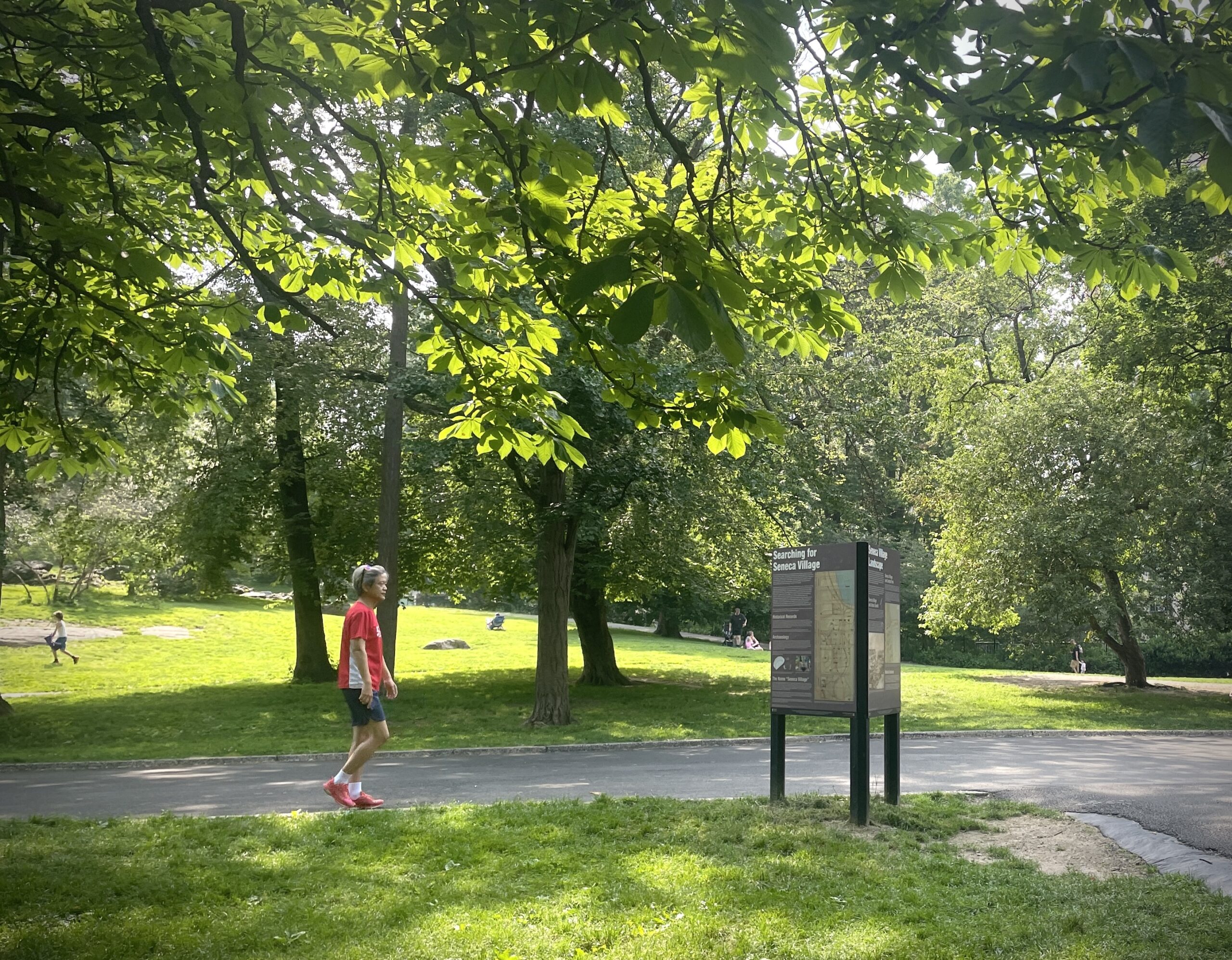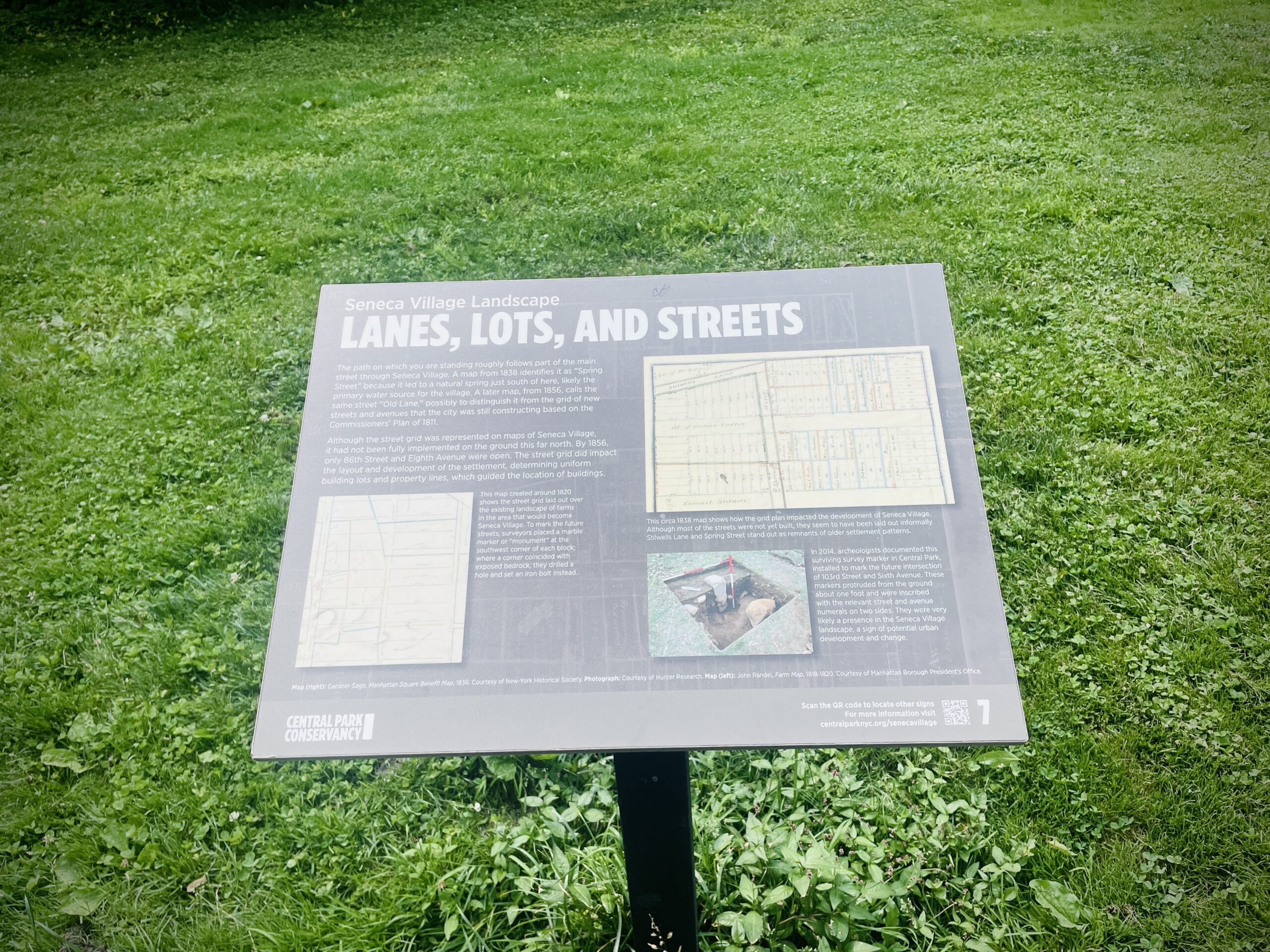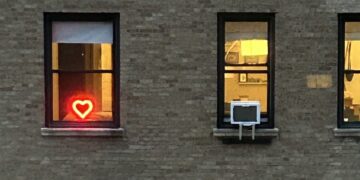
by Yvonne Vávra
Up, up, up. The Manhattan mantra. Skyscrapers climbing, eyes lifting, hands reaching. Everything’s rising: towers, goals, hopes. Halfway to heaven, not even close. What’s the next stop? Above.
Let’s come down, shall we? Just for a moment. In this city obsessed with going up, sometimes the best stories lie below.
Right now, they’re digging deep into the Upper West Side. Two big holes are being carved out to help make the city more accessible for all New Yorkers. At 81st and 96th Streets, the B and C subway stations are getting long-overdue elevators. At 81st, excavation has just begun.
There’s something thrilling about watching the city get cracked open. As workers descend into Manhattan’s bedrock, they’re chipping into time itself. The rocks they drill through are the very foundation the city conquered with its 1811 plan to impose a street grid on the island’s unruly terrain, flattening every rock, hill, and tree that dared to stand.
As explained to the Rag, breaking through Manhattan schist — the near-indestructible, stubborn rock strong enough to hold up our skyscrapers — requires an elaborate approach. Turns out the ground beneath our feet is a true New Yorker. In fighting the schist, today’s workers are reliving history, struggling just like their 19th-century predecessors — only their battle was a bit more unfair. Horses, pickaxes, and the occasional blast of gunpowder were involved.
These rocks have witnessed all of New York’s maneuvers to push forward and pave over what came before. But the ground doesn’t forget, and when you dig into it, it answers back. Like in 1994, when workers broke ground for the West End Towers at West 63rd Street and West End Avenue. They discovered remnants of one of the driving forces behind New York’s rise to commercial, industrial, and social power. Twenty feet below the surface, they found stones that helped forge the railroad connection between New York and Albany, opening Manhattan to the most important trade routes. The stones were part of a massive embankment built in 1847 to carry the Hudson River Railroad across a tidal lagoon that once stretched near what is now 63rd Street. What a find!
You’d think. The developers of West End Towers saved a few stones to build a small decorative wall in the park out front — but didn’t tell anyone how special they were. For two decades, the treasure sat unexplained. No plaque, no story. Just a low wall, slightly out of time and place, raising questions only in the most inquisitive Upper West Siders. The mystery was solved in the summer of 2015, when urban archaeologist Joan H. Geismar, who had led the exploratory trench during the towers’ construction, championed the installation of a sign, finally unearthing the meaning of what had already been unearthed.
What other stories lie buried in the dark simply because no one chose to tell them? What does a historical gem have to do in this town to get a plaque?

Further uptown, a story left in the dirt for over a century began to resurface in the 1990s. It was a chapter from around the same era when the railroad embankment was built. In the area that’s now Central Park — between 82nd and 89th Streets, bordered by Central Park West and what would be the extension of 7th Avenue — free Black New Yorkers purchased land and built a thriving community called Seneca Village. With the first settlers arriving in 1825, it grew into a home for nearly 300 residents, with churches, a school, and more than 50 houses. In 1857, the city acquired the land to build Central Park, and residents were forced to leave their homes. The village was razed, and the community was erased from memory.

More than a century later, historians began to take interest in what Seneca Village could tell us about the domestic life of middle-class African-American New Yorkers in the 19th century. In 2011, after another decade of research and preparation, archeologists dug for eight weeks and unearthed the everyday world of Seneca Village — fireplaces, cooking pots, toothbrushes, porcelain, school supplies, and more. Today, you can walk through an outdoor exhibit featuring 16 signposted locations.
There we have it: To get a plaque in this town, it takes patience.
Just like with a friend, it’s the willingness to dig a little deeper that makes for the best connections. It’s true for our relationship with ourselves, too. Getting beneath the surface takes effort and care, but it’s how we grow and understand who we are and where we’re from. And that’s when life starts to sparkle!
Living on the Upper West Side, our neighborhood’s stories are all around us — sometimes waiting for someone to move the earth a little and bring them to light. The more we look, listen, and explore, the more fun it is to be an Upper West Sider.

Yvonne Vávra is a magazine writer and author of the German book 111 Gründe New York zu lieben (111 Reasons to Love New York). Born a Berliner but an aspiring Upper West Sider since the 1990s (thanks, Nora Ephron), she came to New York in 2010 and seven years later made her Upper West Side dreams come true. She’s been obsessively walking the neighborhood ever since.
Subscribe to West Side Rag’s FREE email newsletter here. And you can Support the Rag here.









Beautiful. Thank you.
So interesting. Thank you.
What an interesting and wonderful article! Thank you for cheering my morning!
Hey y’all your favorite girl here DJ! Love this!
Thanks!
Loved this! So well written, interesting and fun.
Can Yvonne write or what?
Nailed it again Yvonne!
Great investigations and great writing. Thank you for teaching us!
Could one of your talented writer/researchers find out where exactly was Stryker’s Bay, and when and how was it filled in?